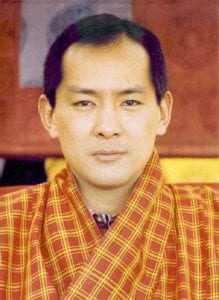For my grade 9 expedition trip this year, I decided to go to Bhutan. Bhutan is a country known for its happiness index, ranking at 9th in the world. I believed that this must be impacted by their culture and their way of life and so in my time at Bhutan, I did a little investigation into why this may be the case.
 When asking my tour guide (Tsering) about happiness, she answered very simply. She said that Bhutan is a small country still run by a constitutional monarchy. When the 4th king came into power, he had a choice of either growing the GDP of the country and wealth through growing more factories in the natural beautiful country or focusing on the well being of the country and the long term impacts. Tsering said that if you look at the well-developed countries that are very rich right now, they are struggling because of their carbon emissions, but a country like Bhutan focuses on the smaller happiness of individuals above the product produced. The 4th king set up schools and hospitals and preserved the culture and tradition of the past to continue on into future generations. As a result, Bhutan is currently not struggling due to its carbon emissions, like many other countries around the world and is able to focus on long term progress to the well being and society of their people.
When asking my tour guide (Tsering) about happiness, she answered very simply. She said that Bhutan is a small country still run by a constitutional monarchy. When the 4th king came into power, he had a choice of either growing the GDP of the country and wealth through growing more factories in the natural beautiful country or focusing on the well being of the country and the long term impacts. Tsering said that if you look at the well-developed countries that are very rich right now, they are struggling because of their carbon emissions, but a country like Bhutan focuses on the smaller happiness of individuals above the product produced. The 4th king set up schools and hospitals and preserved the culture and tradition of the past to continue on into future generations. As a result, Bhutan is currently not struggling due to its carbon emissions, like many other countries around the world and is able to focus on long term progress to the well being and society of their people.
Another important factor that I realised when going on this trip was the culture and religion of the people. 79% of the population is Bhudist and as a result, there are many places of worship, especially temples all around the country. People come to these places to cleanse away their evils and pray. They mention these as the 3 poisons to evil in the Buddhist religion, and these are known to be greed, delusion and ill-will. This signifies why the people of Bhutan are deeply ingrained in the belief of trying to rid themselves of greed. This is why the people seem happy with what they have and do not have a strong belief in wishing for more. When I asked both my tour guides on the trip, they both said that they are not very rich nor very poor so they are happy with what they have and do not wish for more wealth. This proved to me as very significant, as in modern day society, we always aim to be the best and to have the most. But, it is very possible that these beliefs are building our unhappiness, stress and misfortune. Ridding ourselves of this greed is possibly how we can achieve a happier life.
population is Bhudist and as a result, there are many places of worship, especially temples all around the country. People come to these places to cleanse away their evils and pray. They mention these as the 3 poisons to evil in the Buddhist religion, and these are known to be greed, delusion and ill-will. This signifies why the people of Bhutan are deeply ingrained in the belief of trying to rid themselves of greed. This is why the people seem happy with what they have and do not have a strong belief in wishing for more. When I asked both my tour guides on the trip, they both said that they are not very rich nor very poor so they are happy with what they have and do not wish for more wealth. This proved to me as very significant, as in modern day society, we always aim to be the best and to have the most. But, it is very possible that these beliefs are building our unhappiness, stress and misfortune. Ridding ourselves of this greed is possibly how we can achieve a happier life.

When in Bhutan, I also noticed that the overall attitude of the people there was different. They care deeply about one another and simple strangers are always bringing around a sense of kindness with one another that seems genuine. They do simple acts of kindness for one another, wave at anyone that comes across and always seem to put on a smile. When doing a homestay in one of the houses of the Bhutanese people, I was able to realise this greater than before. They gave us great mattresses and most of their blankets when they were sure to be cold as well, allowed us to indulge in the great food that they provided and treated us better than I would have ever expected. Even while in camp, I realised this from the staff working. They woke up at 4 am, just to provide us with breakfast, trekked up mountains with our heavy bags and food and made sure to always help us feel comfortable when tired of trekking. It is this simple attitude of the great care they put into their actions and their care for one another that is so strong which builds that happiness. The trust within the people was stronger than I would have ever believed it to be.
Lastly, I believe it is because of the simple reminders in day to day life to relax, not rush and take it easy sometimes  when needed. In the cosmopolitan world, we always believe that everything needs to be done now, fast and quick. But in Bhutan, they believe in the natural flow of life. While in Singapore, we may complain if there is traffic on the roads, but Bhutan seems to have a more lenient approach where they let it slide. This is further emphasized through the street signs dotted around the whole country, reminding people not to speed, not to rush and simply relax. These reminders, though very simple have a large impact on how an individual reacts in situations and can change their mindset.
when needed. In the cosmopolitan world, we always believe that everything needs to be done now, fast and quick. But in Bhutan, they believe in the natural flow of life. While in Singapore, we may complain if there is traffic on the roads, but Bhutan seems to have a more lenient approach where they let it slide. This is further emphasized through the street signs dotted around the whole country, reminding people not to speed, not to rush and simply relax. These reminders, though very simple have a large impact on how an individual reacts in situations and can change their mindset.
All of these things are significant to the contribution of the overall happiness in the country and continue to grow the happiness of future generations in Bhutan.
Wow, sounds like an amazing experience you had, I have learnt a lot about the culture of Bhutan just from reading your report. Sound like you experience a lot of personal growth through developing an understanding of their culture. I wonder what aspects of this you take through and apply with your personal life or spread amongst your family and friends. Really enjoyed reading this.